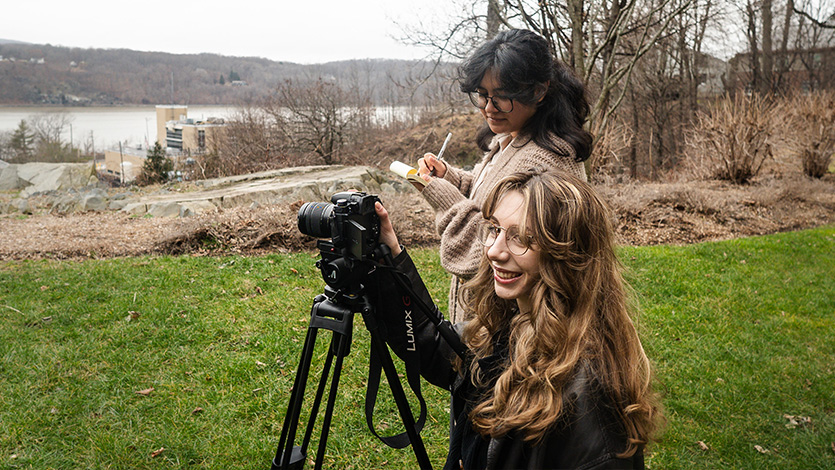Documentary Class Bridges Communities and Cultivates Skills in Storytelling

February 6, 2024 — A new experiential learning documentary class at Marist offers students an immersive journey into the world of visual storytelling while connecting with the local community. This innovative course, called Documentary Film Production, has already left a mark on the students involved.
“We were pushed beyond the Marist campus and challenged in real-world settings,” said Anaiya Marie Bobo '23.
The course is taught by Professor Jeffrey Basinger, Assistant Professor of Communication & Multimedia Storytelling, an Emmy-winning multimedia producer with an extensive background in short-form documentary work. His vision was to create a course that equips students with critical skills and provides them with real-world experiences mirroring those encountered in the industry.
“The students in this class experienced many hurdles but also had the chance to collaborate with other creative individuals from outside entities,” said Professor Basinger, who plans to bring the class back next fall. “At the end of the semester, they had an actual deliverable, the documentary, that somebody could watch and see that they know how to tell a story succinctly.”
Use the following links to view the published documentaries:
- The Glow From Two Miles Away
- Willow Roots: Keep Feeding the People
- Prospects to Pinstripes
- Troubled Waters
Real-World Experience
“Creating a documentary is not a walk in the park. Traveling to various locations, lugging around heavy camera gear on an early morning in the pouring rain, and hours of editing was a lot to handle,” said Christina Georgiou '24. “But this class gave me experience and independence, allowing me to grow and flourish.”
Christina was one of the first group of 18 students who took the course last fall. Over four months, the students went on a creative journey learning various stages of documentary production. In the classroom, the students watched and critiqued documentaries to explore nonfiction storytelling techniques. They also learned the basics of lighting and sound design.
However, outside of the classroom, students really went to work. They scouted the Hudson Valley for shooting locations. From finding the right equipment to editing the final narrative, each step was a testament to the student’s dedication to their documentary.
“The best thing about this course was how much hard and soft skill knowledge I gained from simply participating in the process,” Anaiya '23 said. “From identifying and interviewing subjects in various circumstances to editing and tweaking our final product, we truly got to do it all in film storytelling.”
Professor Jeffrey Basinger working with students in the Lowell Thomas lobby. Photo by Yasir Olenja '24/Marist College.
Connecting with the Community
One of the defining features of the class is its collaboration with local nonprofit news outlets, including The Highlands Current, Peekskill Herald, The New Pine Planes Herald, Delaware Currents, The Daily Catch, and The Lakeville Journal. This partnership provided students with valuable guidance and ensured that their documentaries addressed topics of significance within the Hudson Valley community.
"Generally, a student will do a documentary on a friend or something campus-related, but this is less useful in your portfolio. It's not as marketable,” Professor Basinger said. “It was important that the students work with an outside entity like they would in the industry. The nonprofit groups were an excellent opportunity for students to get published and learn how to work with professionals while learning about their community.”
The class comprises six groups, each paired with a specific news outlet. Each group is tasked with addressing a story chosen by the news outlet. The narratives range from spotlighting the community efforts of Willow Roots, a nonprofit, to tracing the journey of local athletes to professional leagues.
Some groups delved into more challenging subjects, such as uncovering the effects of gentrification in Peekskill and telling the story of the Migliorelli barn fire in Red Hook. Through this diversity of topics, students gained firsthand insights into the pressing issues affecting their surroundings while honing their storytelling skills.
“The opportunity to dissect the topic of gentrification in Peekskill is the kind of activism and community journalism work that I hope to pursue,” said Anaiya '23. “I loved connecting with others to learn the different perspectives of the Peekskill community. It was incredibly moving. As an interviewer in our group of three, I felt honored that our subjects trusted us enough to give us their input.”
Multidisciplinary Collaboration
The documentary class embraced a multidisciplinary approach by having both media studies and journalism students. This mix of knowledge allowed students to use their strengths, whether in cinematography or interview techniques, fostering a collaborative learning environment.
“This class allowed me to become a more multifaceted person in terms of being a well-rounded budding journalist, which I think really sets students from that class apart from other students when finding jobs,” Laratee VanNieuwenhuyze '24 said. “It's great to have a ton of published written works, but having a published visual story in one's arsenal is always going to be a plus.”
Professor Basinger (second row, third from left) with Documentary Film Production students at a screening of documentaries in December. Photo by Jacqueline Reich, Dean of the School of Communications and the Arts.
At the end of the semester, a screening of all the documentaries took place in the Lowell Thomas screening room. Representatives from each news outlet, along with Dean Jacqueline Reich, attended to view the six documentaries and engage in a Q&A session with the students and Professor Basinger.
“It felt extremely rewarding to see all the finished documentaries after knowing how hard all of us worked throughout the course of the semester,” Laratee '24 said.



